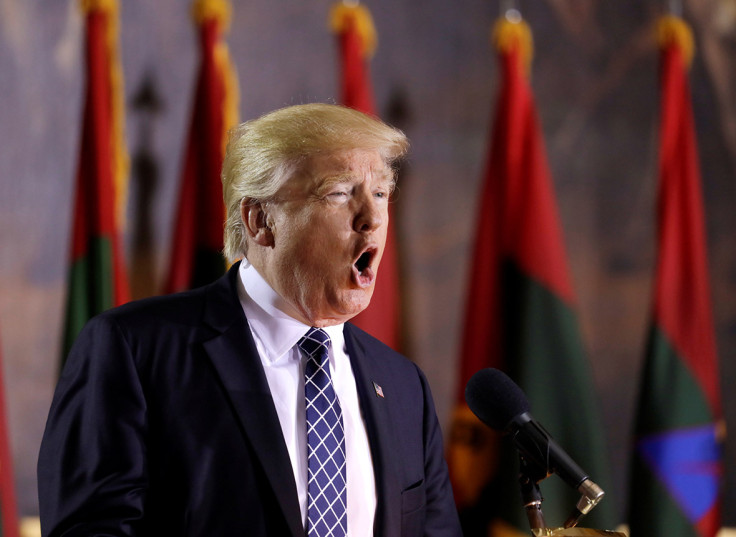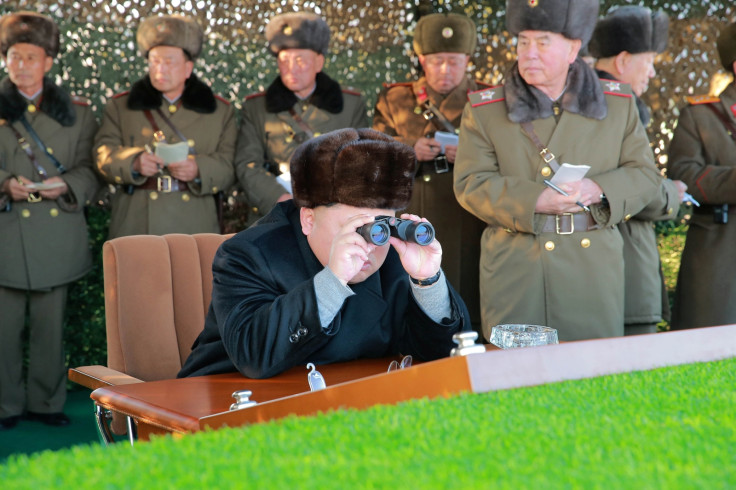As his Syria strike shows, Trump is the man to solve the North Korea problem
Donald Trump is willing to threaten rogue states with military action and then follow through with it.
In the West, North Korea used to be a punchline. The hermit state was known to be repressive and its leaders were seen to be deeply cruel. But amid stories of man-made famines and mass starvation, prison systems and summary executions, Western journalists found something else to write about.
North Korea was not just a threat to its own people and the region. It was also deeply strange to outside eyes, and this weirdness became the story, or at least an important part of it.
The bizarre spectacle of enormous, boastful parades and grand, theatrical performances proved odd enough. Add that to a country where a dead man is president; where that man's son once had a famous film director, Shin Sang-ok, kidnapped because he liked his work; and where the new leader has been compared to a ''fat kid'' with access to nuclear weapons.
All of this seemed comically strange. There was a particularly off-beat episode of The Vice Guide to Travel dedicated to North Korea. And it was used to comic effect in films like The Interview. But as Sony and those involved in that movie found out, the strangeness of North Korea is skin-deep. More important than that is the recognition that North Korea falls into a definite category: repressive, totalitarian states, of which the last century saw too many.
Dictatorships of this sort are violent, internally and externally. They are often expansionist. And they seek to arm themselves, often with banned weapons of mass destruction, as a matter of policy. For North Korea, this manifested itself in a nuclear programme designed to complement large conventional forces, and the threats – of imminent destruction, of annihilation – to which its neighbours and the United States have become accustomed.
The recent escalation in tensions on the Korean peninsula suggests that American policy, which has always sought to restrain North Korea and protect US allies in the region, has been unsuccessful.
Now the task of maintaining peace in east Asia falls to Donald Trump. And though what is going on in Korea presents a dangerous situation and a worrisome threat, Trump may be, paradoxically, the man to solve it.
No discussion of Trump's foreign policy can escape a reference to his dramatic and seemingly out of character strike on the Shayrat airfield in Syria earlier this month. Trump's almost instinctive action against the regime of Bashar al-Assad broke with US policy tradition. But this tradition was a damaging one. It provided a precedent for the United States to sit back and watch as chemical weapons were used on civilians. It hurt the people of Syria through inaction, and diminished America's place in the world.
Trump's policy changed all that. And it did so largely for the best.
Essential to his new foreign policy, it seems, is emotion, and the way Trump reacts to events. In Syria he was provoked into action by the images of dying children. But he was also insulted, offended that the Assad regime would provoke the US, and him as president, in the first place with such naked aggression.
The same can be said in the case of North Korea.

Trump's pride and his sense of American national pride are wounded by the development of North Korean nuclear weapons. They're an affront to him. And also, in his view, they could be both a symbol and a tool of Chinese intransigence. Trump has toned down some of his rhetoric on China, but China's allowing North Korea to go unrestrained must seem more than disappointing.
This emotional aspect to his policy means that Trump is more willing than other presidents, and more personally invested, in restraining North Korea. Vital to this, and to Trump's policy in Asia, is making China see sense.
This can only be done with force. Without the credible threat of force, American policy would be backed up with little. Without someone in the White House who has been seen to be willing to use that force, even the possibility of an American reaction to aggression would ring hollow.
Donald Trump has proved himself ready and prepared to use force against dictatorships. What happened in Syria will have been noted carefully in hostile capitals. It sent a message.
Some have suggested that American cyber warfare forced the failure of a recent North Korean missile test. Sebastian Gorka, an adviser to the president, refused to comment when asked about it on the BBC's Daily Politics, but his silence, and the way he refused to answer, seemed clear enough.
Naturally, it would also be in the American interest to imply that the US has the capabilities to interrupt the military drills and tests of foreign powers. It could all be a bold lie. But the timing seems too good for that to be the case.
Donald Trump's gambit is therefore likely to be backed up with an extensive technical capacity, not to mention the extensive non-cyber capabilities of the world's most powerful military.

This policy has more of a chance of restraining the North than decades of policy conducted without the necessary threat of force – for decades politicians attempted to restrict North Korea's nuclear programmes through diplomacy. For an example, see the Clinton-era Agreed Framework. This has not worked.
Only force, or the threat of it, can.
Furthermore, Trump is very lucky in other ways. He is being well-advised by James Mattis, his secretary of defense, and H R McMaster, his national security advisor. These two men know war and they know strategy.
For all his vaunted business experience, the president does not. But he seems to know when to delegate to those who do. Under their advice, he has abandoned his absurd isolationist posturing and acted to prevent and punish indiscriminate usage of chemical weapons in Syria.
The same logic, and the same essential tactic, can work when facing other despotisms. North Korea is an uncommon state, but it presents a problem which is not unprecedented. Donald Trump is an unconventional politician, and this might mean he is better placed than any of his predecessors to solve that problem.
© Copyright IBTimes 2025. All rights reserved.






















